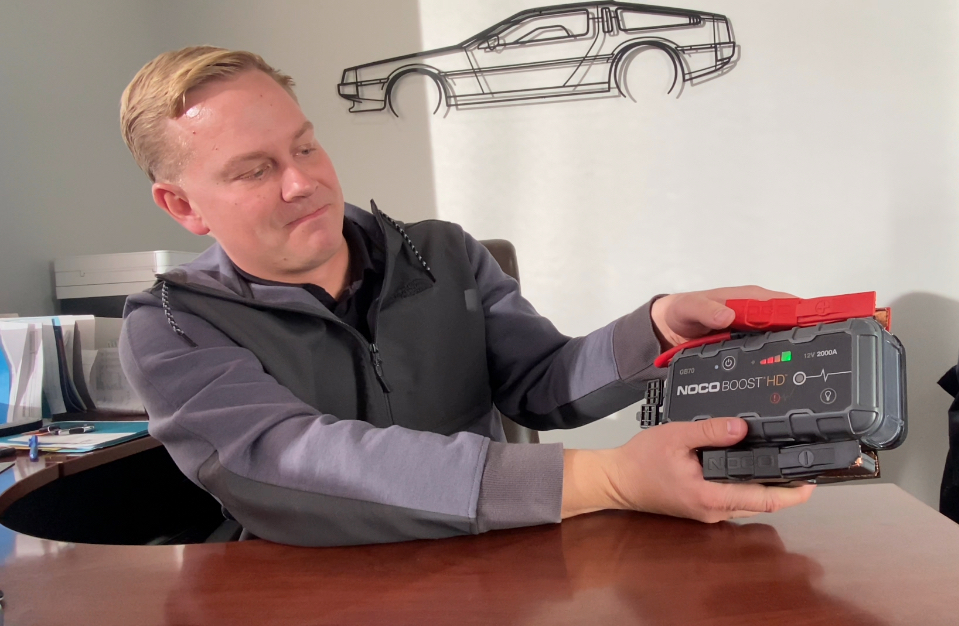West Bend, Wi – Winter in the Midwest can be brutal, especially below-zero temperatures and the toll it can take on your car battery. Lucas Serwe and Josh Yanke from Stellar Motors in West Bend can help walk you through understanding how to prepare your battery for winter, recognize signs of trouble, and know what to do if things go wrong.
Know Your Battery’s Age
First things first: How old is your battery? If it’s more than three to five years old, it may be more susceptible to failure in cold weather. Most batteries are labeled with a manufacturing date either stamped or written on the top. This tells you when the battery was installed or manufactured, which helps gauge whether it’s time for a replacement.
Batteries typically last between five to eight years under normal conditions, but cold weather can accelerate the aging process. If your battery is nearing the end of its life, you might want to consider replacing it before the temperatures plummet.
Signs of a Weak Battery
Serwe said cold weather doesn’t just strain your car battery; it also amplifies the effects of any weaknesses. Look for these signs:
- Slow Starts: If your car cranks slowly or struggles to start, that’s a clear sign your battery is weak.
- Dim Lights: Dimming headlights or interior lights can indicate your battery is losing power.
- Electrical Issues: If your electrical components (radio, wipers, windows) are acting up, it could be due to a failing battery.
If you’re unsure about your battery’s condition, a diagnostic test from Stellar Motors can assess both the battery and your charging system to make sure everything’s in good working order.
What to Do if Your Battery Struggles to Start
Sometimes, despite all the preparation, you might still face the dreaded slow or no-start situation on a cold winter morning. So, what should you do?
- Don’t Keep Cranking: If you turn the key and it’s sluggish or unresponsive, don’t just keep trying. Cranking a weak battery for too long can make the situation worse. Instead, give it a minute and then try again. If it doesn’t start after a couple of attempts, you’ll likely need a jump or a tow.

- Jump-Start the Battery: If you have jumper cables and another running vehicle nearby, you can jump-start your car. Be sure to connect the cables correctly: first, attach the positive (red) clamp to the positive terminal of your dead battery, then connect the other end to the positive terminal of the donor battery. Do the same with the negative (black) clamp and start the donor car.
- Portable Jump Packs: If you don’t have jumper cables, a portable jump pack is a great investment. These compact, rechargeable devices can jump-start your car without needing another vehicle. Just hook them up to the dead battery, and they’ll do the rest. Many people keep them in their car, especially in winter, so they’re handy in a pinch.
Parking Outside? Consider Extra Protection
If you have to park your car outside in cold temperatures, it’s especially hard on your battery. Keeping your battery warm can make a significant difference in how well it performs. Some winter car hacks can help:
- Cardboard in the Grill: In the past, people have used cardboard in front of the car’s grill to help protect the engine and battery from extreme cold. The idea is to keep the engine compartment warmer by blocking some of the wind. While this hack worked in the past, it’s less effective on modern vehicles with better cooling and thermostats.
- Heated Blankets: A heated battery blanket can be a lifesaver. It’s designed to keep your battery warm overnight, so you won’t have to worry about it freezing. These blankets are simple to install and plug into your car’s 12V outlet or an external power source.
- LED Light Bulbs Under the Hood: Some people have used low-wattage light bulbs under the hood to generate heat and keep the battery warm. While LED bulbs do use less energy, they don’t generate enough heat to be effective for battery warmth. This is more of an old-school method that’s fallen out of favor with modern vehicle technology.
Dealing with Electric Vehicles in Winter
Electric vehicles (EVs) are becoming more common, but they also face unique challenges in winter. Cold temperatures can significantly affect an EV’s performance. The battery loses efficiency, reducing the car’s range, and it can take longer to charge.
If you’re parking your EV outside, good luck—you’ll likely face some challenges. To keep your battery in top condition, you may want to invest in an electric vehicle battery heater, which can help maintain battery efficiency in freezing temperatures.
Additionally, if your EV is plugged in while it sits outside, it might help keep the battery warmer, but charging can still be slower. It’s similar to how your body takes longer to warm up in the morning when it’s cold outside—it’s just tougher on the system.
What if I Can’t Get My Car Started?
If your car battery fails and you’re unable to jump it, here are some options:
- Call a Tow Service: Towing companies and roadside assistance services can jump-start your car, or they may tow it to a nearby shop for a more thorough diagnosis.
- Battery Replacement: If you’re stranded and the battery is too far gone, it’s better to get it replaced. Many auto shops, like Stellar Motors, keep a stock of batteries and can replace them in 15 to 30 minutes.









